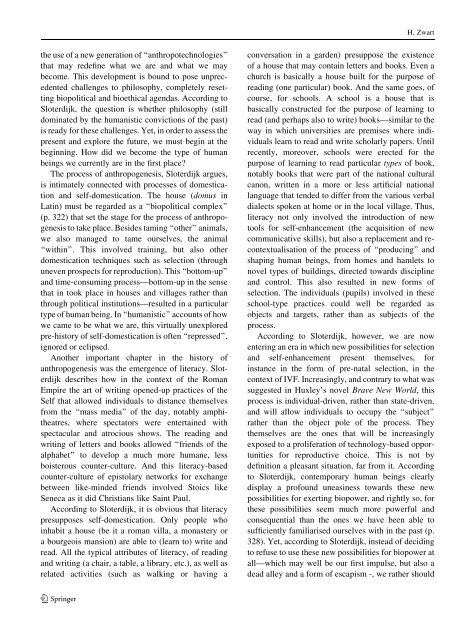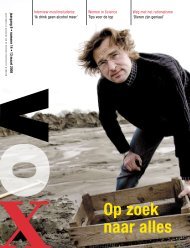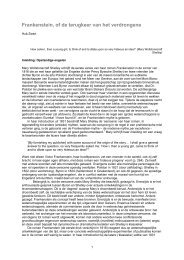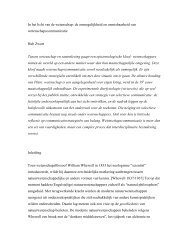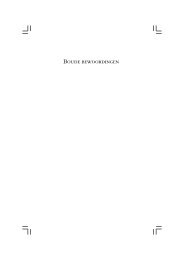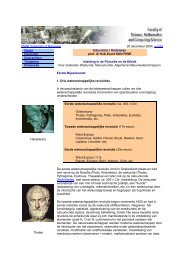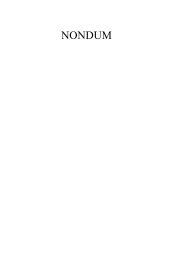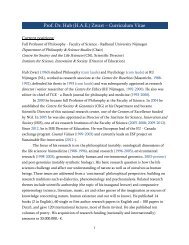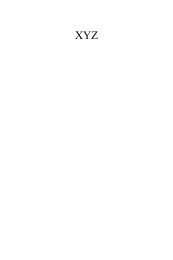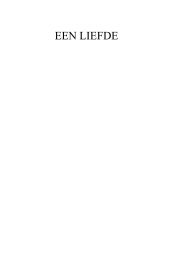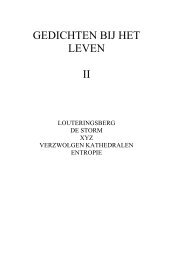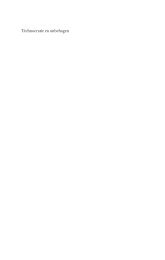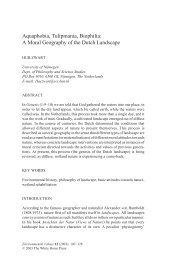Download - Hub Zwart
Download - Hub Zwart
Download - Hub Zwart
- No tags were found...
Create successful ePaper yourself
Turn your PDF publications into a flip-book with our unique Google optimized e-Paper software.
H. <strong>Zwart</strong>the use of a new generation of ‘‘anthropotechnologies’’that may redefine what we are and what we maybecome. This development is bound to pose unprecedentedchallenges to philosophy, completely resettingbiopolitical and bioethical agendas. According toSloterdijk, the question is whether philosophy (stilldominated by the humanistic convictions of the past)is ready for these challenges. Yet, in order to assess thepresent and explore the future, we must begin at thebeginning. How did we become the type of humanbeings we currently are in the first place?The process of anthropogenesis, Sloterdijk argues,is intimately connected with processes of domesticationand self-domestication. The house (domus inLatin) must be regarded as a ‘‘biopolitical complex’’(p. 322) that set the stage for the process of anthropogenesisto take place. Besides taming ‘‘other’’ animals,we also managed to tame ourselves, the animal‘‘within’’. This involved training, but also otherdomestication techniques such as selection (throughuneven prospects for reproduction). This ‘‘bottom-up’’and time-consuming process—bottom-up in the sensethat in took place in houses and villages rather thanthrough political institutions—resulted in a particulartype of human being. In ‘‘humanistic’’ accounts of howwe came to be what we are, this virtually unexploredpre-history of self-domestication is often ‘‘repressed’’,ignored or eclipsed.Another important chapter in the history ofanthropogenesis was the emergence of literacy. Sloterdijkdescribes how in the context of the RomanEmpire the art of writing opened-up practices of theSelf that allowed individuals to distance themselvesfrom the ‘‘mass media’’ of the day, notably amphitheatres,where spectators were entertained withspectacular and atrocious shows. The reading andwriting of letters and books allowed ‘‘friends of thealphabet’’ to develop a much more humane, lessboisterous counter-culture. And this literacy-basedcounter-culture of epistolary networks for exchangebetween like-minded friends involved Stoics likeSeneca as it did Christians like Saint Paul.According to Sloterdijk, it is obvious that literacypresupposes self-domestication. Only people whoinhabit a house (be it a roman villa, a monastery ora bourgeois mansion) are able to (learn to) write andread. All the typical attributes of literacy, of readingand writing (a chair, a table, a library, etc.), as well asrelated activities (such as walking or having aconversation in a garden) presuppose the existenceof a house that may contain letters and books. Even achurch is basically a house built for the purpose ofreading (one particular) book. And the same goes, ofcourse, for schools. A school is a house that isbasically constructed for the purpose of learning toread (and perhaps also to write) books—similar to theway in which universities are premises where individualslearn to read and write scholarly papers. Untilrecently, moreover, schools were erected for thepurpose of learning to read particular types of book,notably books that were part of the national culturalcanon, written in a more or less artificial nationallanguage that tended to differ from the various verbaldialects spoken at home or in the local village. Thus,literacy not only involved the introduction of newtools for self-enhancement (the acquisition of newcommunicative skills), but also a replacement and recontextualisationof the process of ‘‘producing’’ andshaping human beings, from homes and hamlets tonovel types of buildings, directed towards disciplineand control. This also resulted in new forms ofselection. The individuals (pupils) involved in theseschool-type practices could well be regarded asobjects and targets, rather than as subjects of theprocess.According to Sloterdijk, however, we are nowentering an era in which new possibilities for selectionand self-enhancement present themselves, forinstance in the form of pre-natal selection, in thecontext of IVF. Increasingly, and contrary to what wassuggested in Huxley’s novel Brave New World, thisprocess is individual-driven, rather than state-driven,and will allow individuals to occupy the ‘‘subject’’rather than the object pole of the process. Theythemselves are the ones that will be increasinglyexposed to a proliferation of technology-based opportunitiesfor reproductive choice. This is not bydefinition a pleasant situation, far from it. Accordingto Sloterdijk, contemporary human beings clearlydisplay a profound uneasiness towards these newpossibilities for exerting biopower, and rightly so, forthese possibilities seem much more powerful andconsequential than the ones we have been able tosufficiently familiarised ourselves with in the past (p.328). Yet, according to Sloterdijk, instead of decidingto refuse to use these new possibilities for biopower atall—which may well be our first impulse, but also adead alley and a form of escapism -, we rather should123


